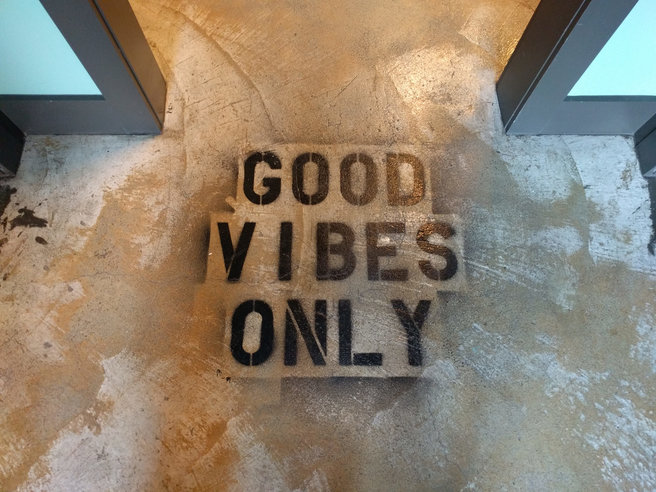The scientific case for feeling good and bad vibes
 Neuroscientists are for the most part doubtful of otherworldly associations with our sentiments and discernments. But, feeling the "vibe" of a room or circumstance is a typical human ordeal, regardless of your religious or philosophical viewpoint. A place may very well not "feel right." Or the general population in a specific room may get a "strong inclination." There have been numerous clarifications for it. One hypothesis says its interesting outward appearances or vocal tones that we get from others, subliminally.
Neuroscientists are for the most part doubtful of otherworldly associations with our sentiments and discernments. But, feeling the "vibe" of a room or circumstance is a typical human ordeal, regardless of your religious or philosophical viewpoint. A place may very well not "feel right." Or the general population in a specific room may get a "strong inclination." There have been numerous clarifications for it. One hypothesis says its interesting outward appearances or vocal tones that we get from others, subliminally.
In any case, a Dutch report offers all the more persuading proof in the matter of why we can get great and terrible vibes. It expresses that people can distinguish chemosignals, through noticing real discharges, for example, sweat or tears left finished from those already at that area. Numerous different warm blooded creatures transmit compound signs, for example, felines leaving cheek rubbings or pee to stamp their region. Be that as it may, regardless of whether people convey concoction flags or not has been a subject of level headed discussion, up to this point.
People as social animals who normally advantage from passionate flagging. When one individual in an old Stone Age band indicated fear, say while seeing an approaching predator, others in the band could wage war and the gathering could safeguard itself, in the event that they tuned into the main onlooker's passionate state. Grabbing on the dread felt by others is known as tactile procurement. Studies have demonstrated that making a dreadful articulation makes us take in additional through our nose, which improves our recognition and accelerates eye developments, so we can find potential threats all the more effortlessly.

Sickened outward appearances, for example, bringing down our eyebrows or wrinkling our nose, signs to others that something is toxic, harmful, or spoiled. This could spare individuals from the gathering from say sustenance harming, by keeping them from eating ruined meat. So passionate flagging encourages us to comprehend each other and impart in a quick and viable way, which is woefully required while exploring troubles in the earth.
People can notice the feelings of others and move toward becoming sensitive to them. Credit: Getty Images.
Jasper H. B. de Groot and partners from Utrecht University in the Netherlands have been working for a considerable length of time to decide whether chemosignals are traded amongst people and assuming this is the case, how it works. In a noteworthy 2012 examination, they had men observe either an alarming or disturbing video while wearing a specific shirt. Each clung to a strict convention so as not to veil their own particular body's aroma while wearing it. These shirts were gathered and given to ladies to smell.
Scientists found that the individuals who got the "dread sweat" shirts demonstrated frightful articulations and the individuals who had gotten "nauseate based" shirts made appalled ones. It likewise modified how well they did in playing out a specific assignment. The Dutch researchers said that despite the fact that we think we just impart through the visual and sound-related modes, our feeling of smell and chemosignals help individuals to end up "sincerely synchronized," empowering them to better face challenges together.
In a 2015 follow-up ponder, de Groot and associates demonstrated that positive feelings could be transmitted similarly. Analysts write in Psychological Science, "We watched that presentation to personal stench gathered from senders of chemosignals in an upbeat state instigated an outward appearance and perceptual-handling style demonstrative of joy in the recipients of those signs." They included, "Our discoveries recommend that pessimistic effect as well as a constructive state (satisfaction) can be exchanged by methods for scents."
Would humans be able to get chemosignals from the individuals who once occupied a room? Credit: Getty Images.
A few researchers proposes that great and terrible vibes in a specific place, the "vitality" of it, might in certainty be our view of positive or negative chemosignals left finished in that specific condition. Note this is another field of research. There are still a considerable measure of questions.

For example, researchers aren't sure how the human mind forms chemosignals. And keeping in mind that a response develops rapidly, they don't know to what extent it endures, regarding whether it holds tight as a kind of passionate buildup, or if it's shaken off rapidly. More investigations should be directed to discover the responses to these inquiries. In any case, it's a solid speculation for feeling "vibes" and the principal confirm based recommendation for what, up to this point, has been for the most part consigned to the domain of the powerful.